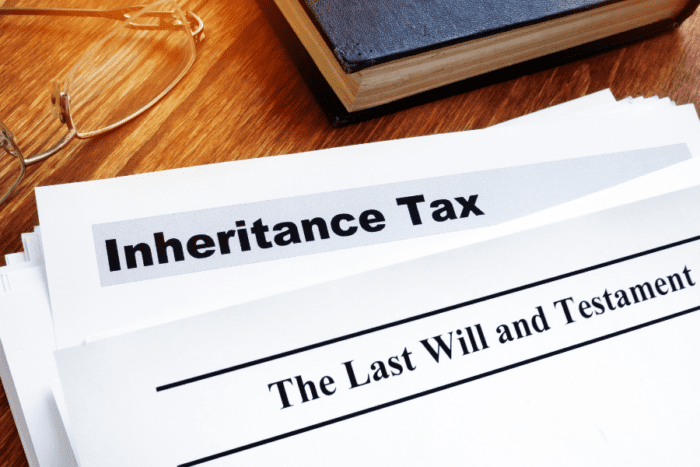Like many financially successful people, you may have generational wealth to pass on to your kids. But the tragedy is that not only do you have to pay taxes during your lifetime, but taxes might also be passed on to your kids, in the form of inheritance tax.
Inheritance tax isn’t common practice among countries, but some governments will swoop in at the last minute and take away a chunk of your wealth. Just like the US and the UK.
In this article we explore inheritance tax and the fully legal means you can use to avoid it.
However, keep in mind that while this article may be informative, it’s not professional tax advice that’s tailored to your situation.
If you’re looking for bespoke tax planning and asset protection strategies, you can reach out here.
Take Full Advantage of Your Wealth
If you ask any wealthy person in the US or any western country how many taxes they pay, chances are they won’t be able to name them all.
There’s income tax, capital gains tax, VAT, property tax, in some cases wealth tax and more. The wealthier you grow, the heavier the tax burden will be.
Governments don’t tax only the wealthy, of course, but many countries have set a threshold for certain tax categories.
That threshold is there to protect the lower and middle class from paying huge amounts in taxes, but what about the people who are barely above that threshold?
By and large, they are considered wealthy enough to afford that expense and hence not given much thought, or sympathy, to be honest.
Moreover, there’s rarely any open discourse about taxing the rich since the majority of the public can’t relate to that class.
But here’s what we think – if you’ve worked hard to get where you are right now, you should get the full advantage of your wealth.
Read on to find out how.
Is Inheritance Tax a Common Practice?
If you don’t know what inheritance tax is, you probably belong to one of the many countries that don’t impose it.
In 2023, less than 30 countries levy an inheritance tax, ranging from 4% in Italy to a top rate of 80% in Belgium.
To put things in perspective, there are 193 UN member states worldwide. So, by the rules of probability, most people worldwide don’t have to worry about paying an inheritance tax.
For example, Australia, Canada, China, and Russia have no inheritance tax. Mexico doesn’t impose an inheritance tax, either. Instead, inheritances are treated as income under the income tax law and are tax-exempt for Mexican residents.
But not all high-tax countries want to let you off the hook that easily.
Inheritance Tax in the UK
With a 40% standard inheritance tax rate, the UK is among the countries that levy one of the highest inheritance tax rates.
According to the official site of the UK government, the inheritance tax is imposed on the part of the estate that is above the £325,000 threshold.
Furthermore, no inheritance tax is imposed on estates above £325,000 if you leave it to your spouse, civil partner, a charity, or a community amateur sports club.
If you leave 10% or more of your estate’s net value to charity, you may be eligible to pay an inheritance tax at a reduced rate of 36% on certain assets.
While the inheritance tax in the UK is pretty high, it’s still far more straightforward than in the US.
Inheritance Tax in the US
In the US, there are federal estate taxes, state estate taxes, and also inheritance taxes.
To make things more complicated, many people have been led to believe that an estate tax is the same as an inheritance tax, which, unfortunately, is not true.
Not only is that not true, but you may even have to pay a federal estate tax, state estate tax, and an inheritance tax depending upon the state you reside in.
Talk about major damage.
This article is about inheritance taxes and how to reduce them, but you can’t do that if you are unclear about the difference between all the “post-death” taxes.
So first, let’s explain what each of these taxes means first.
Inheritance Tax, Federal Estate Tax, and State Estate tax
Federal Estate Tax
A federal estate tax, as the name indicates, is levied on a federal level and is imposed on the transfer of a decedent’s taxable estate at death.
US citizens, residents, and non-resident aliens are all subjected to a top estate tax rate of 40%, but the estate tax exemption and the gross estate definition may vary.
According to the Internal Revenue Service (IRS), US citizens and residents are entitled to a federal estate tax exemption of $10 million, which is adjusted annually for inflation – for 2023, it’s $12.92 million.
While the non-resident aliens are entitled to an estate tax exemption of only $60,000 on US situs property. Inflation doesn’t come into play here.
For a US citizen or resident, the taxable estate is the fair market value (FMV) of a decedent’s worldwide assets at the date of death.
For US non-residents, only US-situs assets are taxed.
State Estate Tax
In addition to the federal estate and inheritance taxes, individuals may also have to pay a state estate tax, depending upon which state they reside in at the time of death.
The state estate tax exemptions are generally much lower than federal estate tax exemptions.
As of 2023, these jurisdictions have estate taxes with the following threshold minimums.
- Connecticut ($12,920,000)
- District of Columbia ($4,254,800)
- Hawaii ($5,490,000)
- Illinois ($4,000,000)
- Maine ($6,010,000)
- Maryland ($5,000,000)
- Massachusetts ($1,000,000)
- Minnesota ($3,000,000)
- New York ($6,110,000)
- Oregon ($1,000,000)
- Rhode Island ($1,648,611)
- Vermont ($5,000,000)
- Washington State ($2,193,000)
If you want to know more about estate taxes and how to avoid them – here’s an article that discusses the topic in detail.
Inheritance Taxes
Right off the bat, there is no federal inheritance tax in the US, rather, the inheritance tax is collected on a state level.
Unlike estate taxes, an inheritance tax is paid by the recipients of the inheritance (heirs, beneficiaries, etc.).
Currently, six states in the US levy an inheritance tax, these are Nebraska, Iowa, Kentucky, Pennsylvania, Maryland and New Jersey.
Now that you know the basics, let’s discuss inheritance taxes in detail.
An inheritance tax is generally imposed on the value of the inherited assets and is paid by the beneficiaries of the inheritance, as opposed to the estate tax which is assessed on the estate itself before it is distributed among the beneficiaries.
The amount that the inheritors have to pay depends on these factors:
- Their relationship with the decedent.
- The value of the inheritance.
- The state in which they live, and the state(s) in which the decedent resided or owned property.
How Much Inheritance Tax Do You Have to Pay?

By taking in an inheritor’s relationship with the deceased person, the value of their inheritance, and the state in which they reside, they can calculate if and how much inheritance taxes they may have to pay.
Inheritor’s Relationship with the Decedent
An inheritor’s relationship with the deceased person could be the very thing that makes a tax-free inheritance possible for them.
Widows and widowers do not pay any taxes on inheritance. Domestic partners may also be eligible for a tax exemption, depending on the state.
Children, grand-children, and siblings are also exempt from paying inheritance taxes in a majority of US states.
Your relationship with the decedent is the primary factor that affects your tax exemption.
Factor in the Value of Assets Inherited
The value of the inherited assets could also play a role in certain states.
For example, Maryland doesn’t impose an inheritance tax if the estate (to be distributed) is valued at less than $50,000. Similarly, Iowa doesn’t impose an inheritance tax if the estate is valued at less than $12,500.
In essence, people living in the US have to assess many factors when calculating their inheritance tax liability.
Inheritance Tax Varies State to State
An inheritance tax is imposed only on the amount of the inheritance that is above a certain threshold. It’s determined by an exemption based on your relationship with the deceased and inheritance value.
Above the threshold, the state inheritance taxes are determined on a sliding basis. In 2023, the federal estate tax ranges from rates of 18% to 40%.
How to Reduce Inheritance Tax

The passing of a loved one is already an awful experience, and adding unnecessary taxes on top doesn’t help. So, here’s what you can do to avoid paying taxes on inheritance.
Consider an Alternate Valuation Date
Typically, the value of the inheritance is determined at the date of the decedent’s death. But in certain cases, an alternate valuation date can be chosen by an executor.
The alternate valuation date is six months after the date of the decedent’s death.
Once you choose the alternate date, you can’t undo that decision, and you have to stick to it.
Choosing an alternate date in a declining market can play to your advantage since then you will have to pay taxes on the reduced value of the estate, as compared to the date of the death.
This way, you will be able to avoid or minimize estate taxes and save the beneficiaries a lot of money in tax liabilities.
Life Insurance Policies as a Medium to Transfer Assets
If you want to reduce or avoid estate taxes, you can use life insurance payouts as a medium to transfer your assets to your beneficiaries.
A life insurance payout to a named beneficiary will not be subjected to inheritance tax and is essentially tax-free at face value.
Furthermore, money received from an insurance payout is not considered taxable income. This way, not only will you reduce your estate tax, but your beneficiaries will also not have to pay any taxes on their inheritance.
Put Your Trust in a Trust
At Nomad Capitalist, we are no strangers to trusts and how beneficial they can be. Setting up a trust, whether onshore or offshore, is a great way to protect your assets from the probate process, and misuse at the hands of the beneficiaries.
A trust also offers the grantor or the settler far more power over the management of their assets and how they’ll be used in the future. There are many different kinds of trusts, but below, we have mentioned the two most common ones:
Revocable Trust: The settlor or the grantor has full control over a revocable trust.
A revocable trust, as the name indicates, can be altered or even canceled by the grantor at any time. In the case of a revocable trust, the beneficiaries only get the property after the death of the settlor.
Irrevocable Trust: An irrevocable trust, as the name suggests, cannot be altered or canceled at any time by the grantor. Once it’s properly set up, it cannot be undone, not even by the grantor.
Once you hand over your estate to the trust, the trust becomes the owner of the estate, and thus, that chunk of the estate is no longer subjected to estate taxes or inheritance taxes.
It may sound extreme and even counter-productive, but this lack of flexibility is the very shield that protects the assets of an individual or a business from malicious lawsuits later in life.
The grantor cannot retrieve their assets back from an irrevocable trust, even when ordered by a court of law to pay for a lawsuit. Once in the protection of the trustee, the assets are secure for life.
Now, take this all, and add an extra protective layer of a foreign jurisdiction, preferably a tax-free or a tax-friendly country, and the courts of your country will never be able to snatch your assets.
That’s the power of an offshore trust. Want to know more? Check out our ultimate guide about offshore trusts where we explain the whole concept in detail.
Do it the Nomad Way
Instead of sticking to one place and playing by its rules all your life, why not go where you are treated best?
If your home country seems to be bent on the idea of taking away huge chunks of your wealth in the name of taxes, why not get a second passport and move to a country with no taxes at all?
If a tax-free country is not offering the lifestyle that you prefer, there are many other tax-friendly countries to choose from, offering a similar lifestyle that you may be used to, like the Italian Golden Visa Program.
With all the taxes that you have to pay during your lifetime, it’s already pretty hard to create generational wealth and leave a legacy for your heirs.
And it doesn’t end there. Estate taxes and inheritance taxes could still rob your beneficiaries of a large chunk of their inheritance.
If you want to do something about it, through proper tax planning and completely legal strategies, contact us here.









